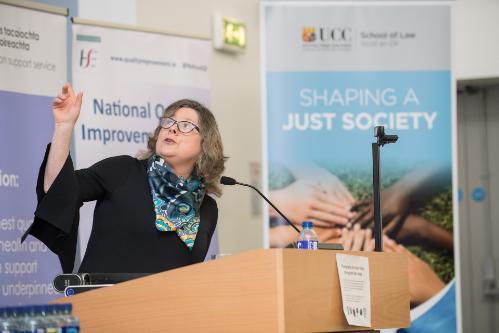In This Section
- Home
- About us
- People
- Courses
- Current Students
- Research
- Shaping Society
- Careers
- News and Events
- Alumni
- International Applicants
- College of Business and Law
- Scholarships and Prizes
- European China Law Studies Association Annual Conference 2025
School of Law hosts conference on critical new health and social care reforms for people with capacity issues

Professor Mary Donnelly addressed the conference held at UCC, which prepared staff in health and social care settings for key reforms which will be introduced with the full implementation of the Assisted Decision-Making (Capacity) Act 2015.
The Assisted Decision-Making (Capacity) Act 2015 provides a modern statutory framework for supported decision-making and establishes the Decision Support Service (DSS), which will help to ensure that people are afforded the fundamental human rights to make their own decisions as far as possible about their personal welfare, property and affairs and finances.
The conference was well attended by medical, legal and advocacy groups from across the country, and was organised by the DSS, the HSE and UCC School of Law with the stated aim of exploring the potential of the 2015 Act to support people who have issues with decision-making capacity to remain at the centre of all decisions related to them, and reinforcing the need for the legislation to be supported by government.
Other speakers over the two-day event included UCC School of Law alumnus and recent nominee to the Supreme Court, the Hon Ms Justice Marie Baker; Barrister, Writer and Educator specialising in Mental Capacity Law for England and Wales, Mr. Alex Ruck Keene; Director of the Decision Support Service, Ms. Aine Flynn; National Programme Lead for the HSE National Assisted Decision Making and Consent Office, Ms Caoimhe Gleeson; and patient and family representatives.
Despite the fact that human rights are protected under Irish and international law, the conference heard that some people in Ireland find that they are not supported to make their own decisions (such as what to eat, what to wear, where to live, whether or not to access medical treatment).
Instead, people whose decision-making capacity is impaired are still subject to an outdated law from 1871 called the Regulation of Lunacy (Ireland) Act. This group of people includes people with intellectual disability or cognitive difficulties due to an accident or condition such as dementia, and people with mental health issues. 316 people have already been admitted to wardship in 2019 under this outdated legislation. Many more continue to have decisions made for them outside of the legal framework.
The Assisted Decision-Making (Capacity) Act (2015) is about supporting decision-making and maximising a person’s capacity to make their own decisions. This new law provides a number of ways to support people to make their own decisions even when they lack decision-making capacity. It allows any of us to appoint friends or family members to help us make decisions, and/or to represent our will and preferences, beliefs and values when we are no longer able to do this for ourselves.
Speaking ahead of the conference, Professor Mary Donnelly, UCC School of Law, and Chair of the HSE Assisted Decision Making Steering Group said:
“With collaboration and goodwill, we have an opportunity as never before to empower people who need support in making decisions to participate as fully as possible in the decisions that affect them and allow them to live their best lives according with their own will and preferences, beliefs and values. This is important for everyone in society - any of us may need this Act at some point in our lives.
The ongoing reliance on the Victorian concept of wardship is inexcusable in a modern context and is blatantly in contravention of the State’s international law obligations. Yet this important issue is not getting the political attention which it merits. Legislation to introduce some necessary amendments to the 2015 Act has still not been introduced and the resources needed for full commencement are not being made available.”
Professor Donnelly continued:
“Our aim is to ensure that the commencement of this Act remains a priority for government, and that we continue to highlight the urgency for a clear timeframe and commitment of resources to enable full commencement.”
For more information on the Assisted Decision-Making (Capacity) Act 2015, please visit www.mhcirl.ie/dss and www.assisteddecisionmaking.ie.
School of Law
Scoil an Dlí
Contact us
Room 1.63, Aras na Laoi, T12 T656
